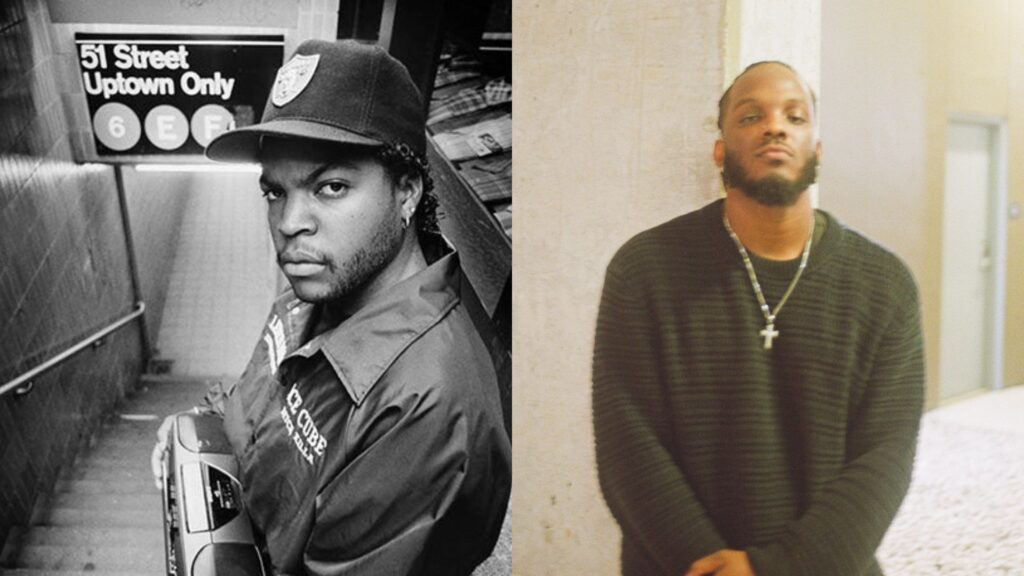
In his latest album, “The Sun Shines On Us All,” Bronson “Israel” Jones leads listeners on a journey of personal growth and maturation. A standout piece is the fifth track, “O’Shea,” where Jones draws parallels between his experiences and those of the iconic O’Shea “Ice Cube” Jackson.
The song details Jones’ encounters with exploitation during his time as a signed artist. As the song continues, however, it becomes a testament to his resilience in the face of adversity.
Within the song Jones states,
“I was blinded by it too so I ain’t judging you. I’m preaching the message, deal with the press later. It’s only up to you rapping ain’t gone save you. I feel like O’Shea let me grab my bag. I need all my checks in advance lil boy I need my cash. It be the n*ggas who will do you worse but claim your friend…”
Jones highlighted that Cube’s story felt like his own, having faced similar challenges with his previous management.
In Cube’s 1990 interview with Spin magazine, he openly voiced his concerns about N.W.A manager and the owner of Ruthless Records, Jerry Heller.
“When you contribute to the sale of three million albums, you expect more than $32,000. Jerry Heller lives in a half-million dollar house in West Lake and I’m still living at home with my mother,” Cube said.
Jones, too, shed light on the legal exploitation of artists who are often struggling to make ends meet.
Another line within the song states,
“I live inside reality nothing is happenstance. I give a f*ck about a rap promoter tryna make his quota f*ck them n*ggas over starving in the process… Monopolies allowed to put that sh*t inside the contract.”
Unfortunately, circumstances like these are all too common among emerging talents.
Daniel “Dajo” Johnson, also known as Danny Edmonds, is the producer of “O’Shea.” He, too, has encountered similar situations and emphasizes that “O’Shea” acts as a cautionary tale for independent artists like himself.
“This song taught me to know my worth as an artist and to obtain a greater understanding of the business side of the music industry. Greed and extortion are going to be present within any industry. In the music industry, it happens more often, especially to young, impressionable Black youth who are willing to do whatever just to get closer to their dreams and help out their family,” Johnson said.
Despite the ongoing challenges with his previous label, Jones expressed gratitude for facing such issues early in his career.
“Artists fall victim all the time because, at the end of the day, they just want to create … but they need the platform and people to put them in higher positions. I knew when I signed it wasn’t the best deal. I was ignorant to it at first and they were quietly putting needles in my back. It was a blessing in disguise. When I got played, I didn’t have millions. They robbed someone that didn’t have anything,” Jones said.
Jones now has his label, Brick Road Records, which was started alongside Giahni Bosquet, Derrick Taylor and Trentin “BOMA” Cintron.
“Now I have my own label and I know what to do, what not to do and what to watch out for. Nobody will ever play me again when it comes to business,” Jones said.
Just as Cube went on to launch a successful career in music and entertainment following his departure from Ruthless Records, Jones is on a similar trajectory.
Brick Road stands as a testimony to resilience. Jones aspires to create a legacy that will not only allow his words to live on forever, but unite his community for the better.
“This song is about standing on your 10. You don’t need these people who are trying to manipulate you. You pay God by living in your truth; that’s the sun shining on you,” Jones said.
“O’Shea” is one of 15 songs featured on Jones’ latest album, “The Sun Shines on Us All.” For those eager to delve more into Jones’ coming-of-age journey, the album is available on all major listening platforms.